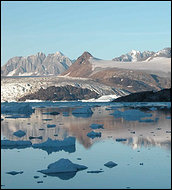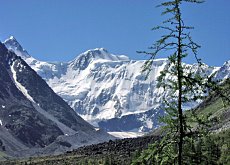GLACIER MELT COULD SIGNAL FASTER RISE IN OCEAN LEVELS
 The new data come from satellite imagery and give fresh urgency to worries about the role of human activity in global warming. The Greenland data are mirrored by findings from Bolivia to the Himalayas, scientists said, noting that rising sea levels threaten widespread flooding and severe storm damage in low-lying areas worldwide.
The new data come from satellite imagery and give fresh urgency to worries about the role of human activity in global warming. The Greenland data are mirrored by findings from Bolivia to the Himalayas, scientists said, noting that rising sea levels threaten widespread flooding and severe storm damage in low-lying areas worldwide.While sea-level increases of a few feet may not sound like very much, they could have profound consequences on flood-prone countries such as Bangladesh and trigger severe weather around the world.







